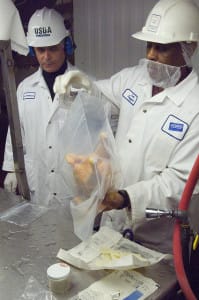Green Bay Press Gazette
by Michael Greger
 |
Avian influenza is sweeping the Midwest with outbreaks in 12 different states.
Wisconsin Gov. Scott Walker declared a state of emergency in Wisconsin, enlisting the help of the National Guard to contain the disease. Last month, an outbreak struck a Jefferson County egg facility that confines some 200,000 chickens. Since then, 10 other farms have been infected.
Across the country, millions of birds have already died from the virus directly or been slated to be killed to prevent the flu from spreading. Highly pathogenic bird flu outbreaks like these, which were once a rare occurrence, now happen almost every year.
While the poultry and egg industries try to blame ducks and geese flying overhead (strange, since these animals have been doing so for thousands of years) the real culprits are the overcrowded, unsanitary and inhumane conditions in today’s industrial animal agriculture system.
Wisconsin factory farms have also ended up in the headlines due to undercover animal abuse investigations. In the wake of public health scares such as bird flu, as well as outrage over animal cruelty, lobbyists for the agribusiness industry are fighting hard to keep the public in the dark about filthy and inhumane conditions on factory farms.
Reports suggest that Rep. Lee Nerison, R-Westby, is gearing up to propose a controversial “ag-gag” bill. These bills have been cropping up in several states across the nation and take many forms, but the intent is always the same: to punish whistleblowers in order to stop undercover investigations into facilities that may be abusing animals or threatening food safety.
The type of ag-gag bill Nerison is reportedly considering is particularly deceptive: by requiring whistleblowers to “out” themselves and turn over footage almost immediately, it prevents them from documenting a pattern of abuse.
Large-scale factory farming facilities confine thousands of animals at incredibly high stocking densities, often in windowless sheds or barren feedlots.
Nine out of ten chickens used for egg production are confined beak to beak in wire cages so small that they can’t even spread their wings. Concentrated animal feeding operations confine herds of dairy cattle onto a small land area typically without grass or vegetation.
Without consideration for their welfare needs, these systems cause animals to live the majority of their lives in states of stress and frustration, weakening their immunity and making them particularly vulnerable to disease.
Because of these inhumane conditions, what enters an industrialized poultry farm as a low-grade virus is allowed to flourish and mutate, possibly turning into a high-risk strain with pandemic potential.
While the poultry industry is repeatedly downplaying the threat of the current virus to humans, that could change rapidly. The largest case of avian flu in American history was an H5N2 strain — the same that we have now in Wisconsin — which led to the deaths of 17 million domestic birds and cost the nation more than $400 million during an outbreak in Pennsylvania in 1983.
The H5N1 strain that swept Hong Kong during a 1997 outbreak was notoriously lethal. In 2003, a Dutch strain of avian influenza (H7N7) showed its terrifying potential as it evolved, gaining the ability to jump from human to human, infecting more than 1,000 people.
Industrial agriculture shouldn’t be able to hide conditions that jeopardize taxpayer funds, animal welfare and public health.
If anything, the bird flu pandemic shows we should have more transparency in agriculture, not less. Any attempts by Wisconsin lawmakers to introduce an ag-gag bill should be abandoned immediately.
Dr. Michael Greger is the author of “Bird Flu: A Virus of Our Own Hatching” and the director of public health and animal agriculture at The Humane Society of the United States.

